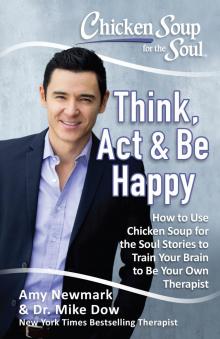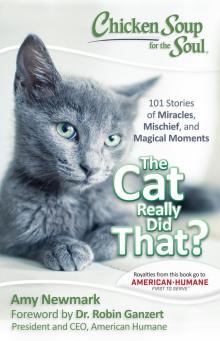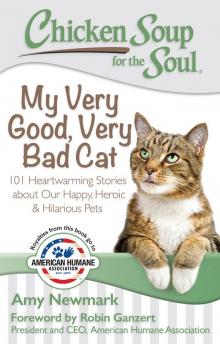- Home
- Amy Newmark
Chicken Soup for the Soul Page 4
Chicken Soup for the Soul Read online
Page 4
My wife loves shells almost as much as she loves hiking, so she jumped up and walked over to where the kids were playing. She grabbed a shell and held it up like a prize. I grabbed the dog’s leash, and we walked over to join her. The dog jumped up and down and seemed to be telling my wife that the shell looked great. They both examined the shell closely as if they had found a gold nugget. My wife smiled as she picked up more shells.
I began looking around and saw a perfectly flat stone on the ground. In an instant, I recalled skipping stones near the lake where my grandfather took me fishing as a kid. I loved skipping stones! Watching a flat stone skip across the top of the water seven or eight times was like watching some sort of magic trick. I told my wife she could keep her shells; I had found a skipping stone. She gave me a puzzled look and then asked, “What’s a skipping stone?” I walked over and showed her the flat, thin rock.
I said, “Watch this!” I flung the stone in a perfect motion so that it would hit the water just right and then skip along the top several times. She looked on in amazement and asked how I did that. To my surprise, my wife had never skipped stones. I gave her a quick lesson, and then she tried it. After just a few attempts, she was able to skip a stone like a pro. As she became more and more successful at skipping stones, her smile got bigger and bigger.
The dog looked on and was ready to chase each and every rock. I held her tightly so that she did not take a plunge into the muddy stream. A wet, dirty dog would ruin my wife’s joy. For a few minutes, my wife and I took turns holding the dog and skipping stones. We had so much fun that we didn’t notice the sun fading behind the trees. It was time to head back. We stood near the stream as we prepared to make the trek back to the car. For a couple of perfect minutes, I stood behind my wife and wrapped my arms around her waist. I could tell she was content and proud of her new skill. I was simply glad that I was there to share in it.
The simple and unexpected moments are almost always the best ones.
As a boy, I thought skipping a stone was magical. Now, as a middle-aged man sharing a moment with the woman I have loved for over twenty years, it was beyond magical. That’s the beauty of life. The simple and unexpected moments are almost always the best ones, like a moment when you go hiking on a fall day and share something new with your spouse. Her joy of learning how to skip stones for the first time made me feel great, and it made me love her even more. We held hands as we hiked back, just like we did when we first dated. The dog led the way, wagging her tail with each step. The next time my wife wants to go hiking in the fall, I definitely won’t want to skip it!
— David Warren —
Count Your Blessings
A Change in Focus
We can only be said to be alive in those moments when our hearts are conscious of our treasures.
~Thornton Wilder
The biggest mistake I made was the picture I’d created in my mind of how our retired life was going to go. My husband Wayne and I had worked hard through the years and did our financial-planning homework faithfully. We’d raised and educated our two daughters and were debt-free by the time he retired.
He’d enjoyed traveling the world for his job, and I’d assumed we’d travel once the daily office grind came to an end. All indications were that we were lucky in the health department with neither of us having any major issues.
When we’d talk of the golden years, we used to joke that we’d keep kicking until somewhere around age ninety or so. When it was time to go, we’d have one last piece of chocolate cake and then climb on his Harley-Davidson motorcycle for one final spin before aiming into the sunset for good.
It was a nice thought, but it was a no-go in the end.
My husband’s intermittent odd behavior and memory lapses reached a point where we couldn’t shrug them off. Extensive testing and an MRI finally put a name on it — frontotemporal lobe dementia with behavioral disturbance, commonly referred to as FTD — yet another wicked member of the dementia family of illnesses. The future of our retirement years evaporated with the words in the doctor’s office. I was told he was only going to get worse as time passed.
It changed everything, including our relationship, daily conversations, and interactions with our kids and grandkids. Empathy, indifference, inability to remember from one moment to the next, and failing to follow personal hygiene habits that once were routine became the new normal.
We were no longer an “us.” I was now his full-time caregiver and advocate, and he was a dementia patient with no future.
I kept him in our home for as long as I could, but two years after the formal diagnosis, his changes in behavior and his compulsive habits — like walking hour after hour, or eating or drinking just about anything in sight — required him to move to a facility where he could roam freely yet be kept safe.
I was a married woman living a single life in my early sixties. My husband lived six miles down the road behind locked doors.
It felt like some unseen giant picked up my life, tossed it inside a huge sphere and set it on a permanent tilt. Just when I thought I had figured out how we were going to adapt and adjust to this new change in life, the giant would give the sphere another violent spin.
I needed to change the way I looked back—with gratitude for what had been.
The first year he was away, my days were dominated by sadness, loss, depression, and anger. I found solace in a journal because that’s where I found release — and strength. On the lined pages, I could be honest with myself in trying to analyze how I was going to figure out my new life. At least, that was my hope.
Over time, I grew to realize that looking back on what used to be only made me feel worse. I needed to change the way I looked back — with gratitude for what had been.
Every night before I went to bed, I’d write down no fewer than three new things that I felt grateful for that day, such as:
• Going to sleep to the sound of rain
• Apple pancakes for breakfast
• Locating my lost pen
• My Easter decorations were up
• A movie, a cozy house and caramel corn
• Early morning bird chatter
• A twenty-minute nap
• My comfortable bed and pillows
• Coin-fed parking spots
• The checkbook balanced and the bills paid
• Took Wayne out for supper, and he remembered the words to a Beach Boys song
The point became clearer over time: I had a choice. I could focus on what I’d lost, or I could focus on what I still had.
My husband is never going to leave that care facility, but unlike so many afflicted with this horrendous disease, he is easy to redirect, and he is content and not violent. He still recognizes me. I can take him out for rides or a meal. He remembers the words to some of his favorite songs, and he still knows how to play the piano.
His illness has forced me to live in the moment.
I will never see Europe with him. We will never ride through the countryside on his Harley, and we can no longer share our stargazing porch nights like we used to.
But I have four grandchildren who love to play hide-and-seek with me. We color, read books, and sit at their little table and share ice cream. I have the friendship and love of two daughters, as well as two siblings whom I enjoy. And girlfriends, praise heaven! What would I do without my girlfriends? I have my health, a home, a yard to care for, and my writing life.
Clichéd sayings abound on the grief process, and they make grieving and loss sound like they should be easier to navigate than they are. But pages and pages of journaling and gratitude listing each evening reveal that, even in the face of a terminal disease, it is possible to find happiness.
— R’becca Groff —
Thanksgiving x 100
Gratitude turns what we have into enough, and more.
~Melody Beattie
Thanksgiving, to me, used to mean a long weekend, turkey and football. Now, however, it has become my
favorite holiday because of a tradition at my church that has taught me to literally count my blessings.
For years, I had suffered from bouts of depression. One thing that fed the depression was an attitude of discontentment. I never seemed to be happy with my life, especially when I would compare it to someone else’s. Everybody always appeared to be more successful than I was, and I would frequently feel I was not measuring up to either my own potential or the world’s expectations.
Then, in 2008, I started attending Cherry Hills Church in Springfield, Illinois. Every year, they have an evening service on the Sunday before Thanksgiving. Two things happen every time — the food drive and The List.
The week before the Thanksgiving service, every chair in the church has a paper bag underneath it for people to take to a grocery store and fill with food items to be donated to local ministries. Then, at the evening Thanksgiving service, a team of volunteers places all the filled bags of food at the front of the church. The bags of food completely cover all of the steps up to the stage, which is more than fifty feet across. It is quite a sight!
Included in the church bulletin is a sheet with blanks numbered 1 to 100 on the front and back. At the top, it says, “Lord, I thank you for…” The first time I saw this at a Thanksgiving service, I wondered how I would ever be able to think of 100 things I was thankful for.
The pastor allowed a few minutes at the end of the service for us to start filling in our 100 blanks. He said we didn’t have to necessarily complete it just then. Rather, this was an exercise to help us focus on gratitude. I looked at my blank list and was somewhat intimidated. I figured I could probably do ten or twelve, but 100?
Then I heard some kids next to me challenge each other to a race to see who could fill in all 100 the fastest. My competitive nature kicked in. I was not about to be shown up by a bunch of kids. So I started filling in blanks with anything I could think of — big things, little things, serious things and silly ones. I tried to think of any situation in my life where I had ever said, “Thank God for…” Something. Anything. To my own astonishment, I completely filled in the list in four minutes. Then I stuck it back in my bulletin and promptly forgot about it because the service was about to end. What I didn’t know was that the real “service” was just beginning.
There were well over a thousand bags of food sitting at the altar, but every item in every one of those bags needed to be sorted and loaded on a truck. While we had been in the Worship Center hearing a message, singing songs, and filling in our lists, the same group of volunteers that had brought all the bags of food to the altar was setting up tables in the lobby for sorting. There were a dozen or so categories of food items, and two or three volunteers manned each table.
As soon as service was dismissed, many of the 600-plus people in attendance came forward to grab a bag of groceries, and the sorting began. The lobby at Cherry Hills became a roiling sea of humanity, bags, boxes, and cans. In just about an hour, thousands of food items were sorted, counted, boxed and loaded. By 8:30, anyone could have walked into the lobby unaware that anything had taken place there. What a night!
One day not long afterward, I was feeling particularly sorry for myself for no good reason. I found myself sinking into my familiar emotional chasm when I remembered the list.
I took it out and read through it. Obviously, I had filled it out in a rush, but now that I stopped to really think about the 100 entries on the list, my perspective began to change. I found myself laughing and crying at the same time. I started to realize that not only did I have a lot to be thankful for but that the things I had written on that list defined me as a person. They brought out my talents, hobbies, passions, faith, people who had a great impact on me, and so much more.
When one is straining to think of 100 things, the list contains some really random items. For example, #11 on my list was hot sauce. I love hot sauce. I put it on almost everything. But when I think about being thankful for it? Well, then I think back to the food drive that we did the night I made the list. That food was going to people who didn’t have any food of their own on which to put hot sauce. People who didn’t have a place to live. People who didn’t have a job and would have loved to have a boss they couldn’t get along with just to be able to have a paycheck to buy some of that food on which to put their hot sauce.
So, as it turns out, it’s really not a stretch to think of 100 things to be thankful for. I carry my list with me every day in my planner. I do this so that wherever I am, if I am having a bad day, I can pull out my list, circle the next number, and take a few minutes to thank God for it.
Choosing to have an attitude of gratitude has made me more than happy. It has filled me with joy. We use those words interchangeably in our culture, but they mean something different. Happiness is a feeling that comes and goes, but joy is an attitude that can be cultivated. It’s like gas in the tank of my soul. When I give thanks, I feel stronger because I know that there is a power greater than I am who provides me with everything on my list, and so much more.
And knowing that, I can be content and continue to choose joy.
— M. Scott Coffman —
Yogurt
When we focus on our gratitude, the tide of disappointment goes out, and the tide of love rushes in.
~Kirstin Armstrong
It was a rough week. The price of oil skyrocketed as the temperature plummeted in Maine. We were looking at a high of eight degrees that week, and I had missed three days of work so my paycheck was going to be lower than normal. I was stressed, to say the least. I shopped strategically, looking for every possible way to cut pennies so I could buy groceries and keep the house warm.
My eight-year-old son didn’t understand when I told him we were struggling that week. He wanted a special kind of yogurt, but I didn’t have the extra three dollars to buy it for him. It was the kind of yogurt with a cartoon kid riding a skateboard on the front of the box, and a mere two spoonfuls in each cup. It was the kind of product that wastes a parent’s money and makes me hate advertising.
I felt inadequate as a parent when those big eyes looked at me with confusion, as if to say, “It’s just yogurt. What’s the big deal?” So I found a way. I put something back and finagled as single mothers often do. He got his yogurt.
On the way back from the grocery store, I noticed a homeless man holding a sign by the side of the road. My heart hurt, and I tried not to look at him. I watched people dodge him on the street and walk by without even meeting his eyes. I looked at him closely then — bare hands clutching a piece of cardboard, snot frozen to his face, a ripped jacket. And there I was struggling because I had to buy oil — to heat my home.
My home!
I reached into my wallet where I had three clumps of money already folded and ready for rent, oil, and plowing. I had calculated what we needed to the penny.
I handed the man a five-dollar bill. He trembled as he took it.
“God bless you,” he said with a smile. That’s when I started to cry.
My son said from the back seat, “I thought you didn’t have any money to spare, Mom.”
I cried harder.
I told him that the man didn’t have a home or food to eat. I said that he must be freezing, and so I felt like I could spare five dollars after all.
Then my son took his yogurt out of the bag in the back seat and handed it, along with his winter hat, to the gentleman outside his window.
“No, God bless you,” he said in his small voice.
The man looked at me and smiled. I continued to cry while my son sat confused at the outburst of emotions.
The car behind me beeped.
On that day, my son performed an act that most adults wouldn’t have done. He showed kindness and compassion. Even if it was just a matter of a few spoonfuls of yogurt, it was all he had, and he gave it to someone who needed it more than he wanted it.
He showed me that I am doing well as a mother. I’m raising him right. My son showed me that there are al
ways blessings to count if we open our eyes, and that we always have the opportunity to be a blessing for someone else.
— Jamie Coombs —
Choosing Gratitude
There are blessings hidden in every trial in life, but you have to be willing to open your heart to see them.
~Author Unknown
I’m not sure what my response would have been if someone had instructed me to write down everything I was grateful for after my husband died. One thing I’ve learned through personal experience and as a certified grief counselor is that no one wants to be told how to grieve. Yet, on the morning of March 29, 2012, forty-eight hours after my husband’s death, that’s exactly what I did. I sat at my kitchen table and began a tally that would fill three pages of my journal.
• My sisters rushing to my side when they heard the news
• My daughter Emily’s inexplicable compulsion to hug her dad and proclaim her love every day for the previous three months — a compulsion that had concerned both of them, but now was a blessing
• A lapsed life-insurance policy that was reinstated just twenty-seven days before
• The five and a half years I’d cherished with David since his cancer, a period when our marriage was the best it had ever been
• Recent conversations I’d had with my husband about what he’d want me to do if he died before me — a topic we hadn’t seriously discussed before, not even during his cancer fight
David had survived a heart attack and stent surgery, only to pass away sometime during the night three days after I brought him home from the hospital. As a writer, journaling seemed the appropriate method of working through my grief. After all, I’d written through my stint as a caregiver during my husband’s cancer treatment, my mother’s terminal cancer care and subsequent death in 2010, and my five-year-old grandson’s cancer diagnosis a month later. It was no surprise that writing would be part of my healing, but gratitude? I vaguely recalled a Bible verse about giving “thanks in all circumstances,” but looking for things to be grateful for seemed a stretch so soon after David’s death. Yet it was surprisingly easy to come up with a long list:

 Chicken Soup for the Soul
Chicken Soup for the Soul The Joy of Less
The Joy of Less Hope & Miracles
Hope & Miracles The Cat Really Did That?: 101 Stories of Miracles, Mischief and Magical Moments
The Cat Really Did That?: 101 Stories of Miracles, Mischief and Magical Moments The Joy of Christmas
The Joy of Christmas My Very Good, Very Bad Dog
My Very Good, Very Bad Dog My Very Good, Very Bad Cat
My Very Good, Very Bad Cat